| |
 Kam Williams
Kam Williams
Excellent..........*****
Very Good........****
Good................***
Fair.................**
Poor...............*
|
The Gospel
**** 1/2
Prodigal Son Returns Home For Redemption
In Gospel-Driven Drama
It should come as no surprise that a flood of faith-based films would start arriving in theaters in the wake of the astonishing $400+ million box-office magic of Mel Gibson’s independently-produced, The Passion of the Christ. But what probably couldn’t have been predicted is that a major Hollywood studio might create a wholesome, Christian-oriented, family picture as engaging and entertaining as The Gospel.
Ostensibly inspired by the parable of the Prodigal Son as found in Luke 15: 11-32, the movie was written and directed by Rob Hardy. Now unless Mr. Hardy has been Born Again, it’s more than a little ironic that he’s the brains behind this moving morality play, since he’s previously best known for Trois, Trois 2 and Trois 3, a steamy trilogy of thinly-veiled skin flicks passed off as psychological thrillers.
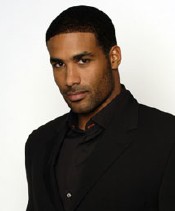
Boris Kodjoe
Be that as it may, The Gospel is set in present-day Atlanta, and features an ensemble cast headed by Boris Kodjoe as David Taylor, the son of the much-beloved pastor (Clifton Powell) of the New Revelations Baptist Church. With the help of an impassioned choir, Bishop Taylor has managed, for years, to keep his loyal congregation on its feet most Sunday mornings.
Soon after the opening credits, we learn that, although David had once envisioned following in his father’s footsteps, he’s long since abandoned a spiritual path for a secular one, finding fame and fortune as a pop singing sensation. Now a teen idol, he currently has a Top 40 salacious hit climbing up the charts entitled "Let Me Undress You."
By contrast, during David’s conspicuous absence, his childhood friend Frank (Idris Elba) has emerged as the heir apparent to his father’s pulpit. Not only is Frank an ordained minister, but he’s married David’s cousin, Charlene (Nona Gaye). The problem is that the young couple is already estranged due to her infertility and his transparent aspirations to become a televangelist by turning her uncle’s fledging church into a media empire via a money-making infomercial.
The plot thickens when Bishop Taylor is stricken with advanced cancer and left little time to get his affairs in order. When David learns that his father is terminally ill, he puts plans for his next concert tour on hold and returns home to take care of his dad, over the objections of his avaricious hangers-on.
Though he had been living life in the fast lane, this return to his roots has the superstar rethinking the many selfish and materialistic choices he’s made. The redeemed ladies man even thinks of settling down, especially after he sets his eyes on Rain (Tamyra Gray), a single-mom raising an adorable five year-old (China Anne McClain) with the help of her forever-meddling sister, Maya (Keshia Knight Pulliam).
While The Gospel introduces more characters than necessary to deliver its simple message about the importance of faith and family, its salient points get delivered despite the clutter of a few too many sub-plots. The script, though occasionally given to religious asides which might bother non-Christians, deals mostly with commonly-confronted, everyday issues of a universal nature.
The best reason to recommend this movie might be its infectious, irresistible spiritual soundtrack, guaranteed to have persons of any faith swaying in their seats. The uplifting music was arranged by Kirk Franklin and imperceptibly woven into the storyline by adding a number of gospel greats right into the cast, including Yolanda Adams, Fred Hammond, Donnie McClurkin, and Martha Munizzi.
Expect to dab away a few tears as you dance up the aisle.
Rating: PG for adult themes, suggestive material and mild epithets.
Running time: 98 minutes
Distributor: Columbia TriStar
Grateful for God, Gospel, Nicole, and the Baby
Boris Kodjoe: The Gospel Interview
Born in Vienna, Austria on March 8, 1973, Boris Kodjoe was one of three children born to Eric and Ursula, the former, a physician from Ghana, the latter, a shrink from Germany. While still in college, the striking 6’2" student was discovered by a talent scout and signed by the Ford Modeling Agency.
Boris’s career skyrocketed after he appeared in ad campaigns for Ralph Lauren, Perry Ellis, Yves Saint Laurent, and The Gap, as he soon found himself in select company as one of the world’s few male supermodels. Next, he turned to acting, making his big screen debut in Love & Basketball, and following that up with Brown Sugar.
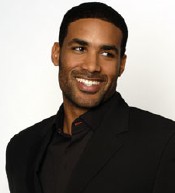
Boris Kodjoe
In 2002, he was recognized by People Magazine who placed him on its 50 Most Beautiful People in the World list. And he was also appreciated by Nicole Ari Parker, his TV co-star on Soul Food and then Second Time Around. The couple married on May 21st of this year, shortly after the arrival of a bouncing bundle of joy they named Sophie Tei Naaki Lee.
Here, Boris bares his soul about his family and his fears in taking on the lead role in The Gospel, a spiritually-oriented drama about a prodigal son who returns home when he finds out about his father’s failing health.
KW: How does it feel to be a daddy?
BK: Unbelievable. It’s the best thing in the world. I love it. She has shown me chambers in my heart that I didn’t even know existed. She’s just incredible.
KW: And how’s Nicole?
BK: She’s great. She’s doing very well. Both are very good.
KW: Would you like to work with her again?
BK: Oh, I could work with her on anything, making pancakes. To me, she’s the best actress of her generation. There’s nothing that she can’t do. She makes be better. I’d work with her in a second.
KW: As someone raised in Europe, were you comfortable with this role?
BK: No, it wasn’t comfortable at all, though it turned out to be great.
KW: Why did you take it then?
BK: I didn’t take it because it was supposed to be comfortable. I took it because it was a challenge. I was looking to show people I could act. I was looking for something that would take me away from the whole hunk riding off into the sunset thing that people wanted me to play after Brown Sugar. A character that had nothing to do with that one specific stereotypical image that we’ve been force-fed every day.
KW: You wanted to stretch as an artist.
BK: Yeah, people wanted to see good stories, different stories. They don’t want to see the same crap over and over again. Yet, that’s what studios do. If one thing works, they’ll keep doing it till it runs its course and people aren’t interested anymore. So, hopefully, this will inspire people to think outside of the box and try new things.
KW: Growing up in Germany, you probably had no exposure to African American gospel music and the Black church.
BK: No, and that was the biggest challenge, besides the fact that it was personally a very emotional film for me to make.
KW: Why was it so emotional?
BK: My wife was expecting, and I didn’t want to be anywhere but home with her. She really kicked me out the door to do this film. She was the force behind my doing it, because she recognized what an opportunity it was before I did.
KW: How did you prepare for the role?
BK: I had to do a lot of work, coming from where I’m from. It’s like you going to China and trying to sound authentic doing traditional theater in a specific Chinese accent. The Southern Baptist Church is a specific culture in itself. So, I had to study, talk to people, watch tape[s], and go to performances to see how gospel artists move compared to secular artists. They’re completely different. Gospel artists are messengers; they are vessels of a message. There was a whole lot to learn in a short amount of time.
KW: Did you enjoy the music while making the movie?
BK: Absolutely, I love gospel. I’m a big fan of all these greats in the movie, Fred Hammond, Donnie McClurkin, who did an incredible job as an actor, Yolanda Adams, Martha Munizzi… they gave me goose bumps while we were shooting. The extras on the set helped it come alive. They felt every take. And they lost their minds. They felt the Holy Ghost. It was all very real and I think that [director Rob Hardy] captured that very well.
KW: Would you say that this role changed your life?
BK: It definitely changed my life, because of the timing, and because of the birth of my daughter, and because of what I went through while shooting it.
KW: How have you changed?
BK: It’s made me a better actor. It’s given me more confidence and showed me that even though I’m from a different place and of a different language background, I can play marginal characters, meaning not just middle-of-the-road characters, but very specific people. So, yes, I feel better, because that’s made me a better man all around.
KW: And how has it affected you spiritually?
BK: One specific difference between how I grew up and my experience in this film is the whole African American… Wait, that word is weird to me because I’m African German. Let’s say Black, the whole Black religious experience, here, is very impressive to me, because when I first arrived I realized that people carry their faith with so much pride. I’d never experienced that. At home, people don’t talk about their faith, or openly acknowledge or praise God at award shows or sports competitions. People don’t talk like that at home. There, it’s almost shameful to do so, which is sad. Here, it’s part of their lives, their personas. I was very impressed by that, and I love the idea of being proud to give credit when credit is due.
KW: Does religion now play a big role in your life and in your relationship?
BK: With Nicole, that’s what we practice. We’re very open and outspoken about our faith and our beliefs. We also talk about our doubts, our moments of insecurities. We talk about it all day, how we’re inspired by God. We recognize little miracles every day, and that’s how we’re raising our daughter.
KW: You seem so in love with Nicole.
BK: Oh, yeah, I’m a fool in love. Definitely. I’m lucky. I’m blessed. I was very single for a very long time. The whole time I was modeling, I had a place in Paris, and a place in New York, and I was really single. Quite single. Yet I wanted to have children, and I knew that was my purpose, but I wasn’t going to settle. I just didn’t know who was going to be my partner. I knew that once I had grown to be a man that I was going to attract the person that I deserved to be with, or deserved to be with me.
KW: How did you two meet?
BK: We met at work, at the first table read for Soul Food.
KW: Was it love at first sight?
BK: I knew immediately that she was going to be in my life forever. I didn’t know in what capacity, but I knew that I had found someone who was going to be close to me for a long time. We became great friends fast.
KW: What attracted you to her?
BK: She’s just a beautiful person. She’s very loving, giving, and open-minded. So, I knew that she was the one pretty soon into the relationship.
Good Night, and Good Luck
****
Edward R. Murrow Role in Demise of
McCarthyism Revisited by
Political Period Piece
To this day, some still consider Edward R. Murrow (1908-1965) to be the most distinguished figure in the history of American journalism. Hailing from Polecat Creek, North Carolina, the legendary broadcaster rose from humble origins to that heralded status by starting out as a radio reporter soon after joining the fledgling CBS Network in the mid-Thirties.
As head of its European bureau, he covered critical events unfolding overseas both prior to and after the outbreak of World War II. Exhibiting his trademark combination of calm and courage, he daily narrated riveting, eyewitness descriptions of the ominous arrival of the Nazis in Austria in 1938. Later, he risked life and limb to air blow-by-blow accounts from atop rooftops around London during The Battle of Britain.

Good Night, and Good Luck
In the Fifties, with the advent of television, Murrow made a smooth transition to the emerging medium, adapting Hear It Now, his news-oriented radio program into a similarly-themed TV-show entitled, See It Now (1951-1958). Fortunately, his characteristic directness, tempered with restraint, still resonated with screen audiences clear across the country.
Yet, he met with even more success with Person to Person (1953-1961), a series which featured a relatively-superficial, celebrity chat format. Nonetheless, Murrow remains best remembered for his harder-hitting, investigative work, most notably, the courage he displayed in standing up to the witch hunt being conducted by anti-Communist crusader Joe McCarthy between 1947 and 1954.
Since America is presently very closely allied with formerly feared enemies Russia and China, it might be hard for some to recall the practically palpable tensions which once existed between East and West. Back then, the junior Senator from staged infamous hearings which resulted in the censorship and blacklisting of anyone with the slightest ties to the so-called Red Menace.
The pivotal role played by Edward R. Murrow in the demise of McCarthyism is the subject of Good Night, and Good Luck, a period piece set in 1953-54 and shot in black-and-white by writer/director George Clooney who also appears as CBS exec Fred W. Friendly. David Strathairn stars as Murrow, while the late McCarthy (who died of alcoholism in 1957) plays himself, via the magic of seamless, computer-generated technology.
The top-flight cast includes Frank Langella as CBS founder William Paley and Grant Heslov as his colleague, Don Hewitt, while Oscar-nominees Robert Downey, Jr. (for Chaplin) and Patricia Clarkson (for Pieces of April) play Joe and Shirley Wershba, employees who had to hide their marital status due to a company policy against hiring married couples. Jeff Daniels appears as Sig Mickelson, and jazz vocalist Dianne Reeves does a phenomenal job of performing several of George’s Aunt Rosemary’s old tunes as originally arranged, and accompanied by Ms. Clooney’s actual band.
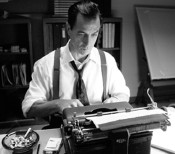
David Strathairn as Edward R. Murrow
Good Night, and Good Luck effectively recreates afresh the air of paranoia which had permeated the U.S. during the Cold War, transporting its audience back a half-century, imperceptibly weaving old newsreels in with painstakingly-recreated tableaus. Though the chain-smoking Murrow emerges as the hero here, he is, nonetheless, upstaged by the technical wizardry which has him sharing scenes with archival newsreels of cultural icons like Robert F. Kennedy and Roy Cohn, both of whom served on HUAC as young attorneys.
As much as one might admire the exploits of Murrow, all the distracting cameos generate as much reflection as the social issues raised by Clooney’s unusually thought-provoking flick.
Rating: PG for mature themes and brief profanity.
Running time: 93 minutes
Studio: Warner independent Pictures
Emmanuel's Gift
*****
Oprah Narrates Triumphant True Tale about
Disabled African Orphan
Emmanuel Ofosu Yeboah was born with a deformed leg in Ghana, a country where most babies born with birth defects are either euthanized or abandoned. In Emmanuel’s case, he was raised by his single-mom till she died when he was a teenager. At that point, the industrious young lad started a shoeshine business, earning about $2 a day till he saved enough to buy a bicycle.
Next, he pedaled clear across his homeland, spreading a message of tolerance while inspiring other handicapped kids to believe that they could achieve anything they put their minds to. So unfolds Emmanuel's Gift, an uplifting biopic about a boy blessed with such a sense of dignity that he refused to accept the second-class status of a life in the streets which his society ordinarily mandated for those with his affliction.
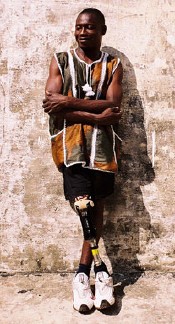
Emmanuel Ofosu Yeboah
Oprah Winfrey narrates this moving documentary, which chronicles two years in the life of the very likable Emmanuel. We see him demonstrate the savvy to have himself fitted for a prosthetic limb, but he then starts a foundation to help hundreds of other cripples get wheelchairs, overdue education and general respect.

Emmanuel's Gift
By the end of this biopic, not only has Emmanuel earned the audience’s admiration, but he has made a convincing case against any sort of discrimination based on infirmity. For this film makes it clear that, if encouraged and embraced, even long discarded pariahs can be taken off the social scrapheap, be resurrected, and enjoy productive lives.
Rating: Unrated
Running time: 80 minutes
Studio: First Look Pictures
|
|
Elizabethtown
*
Bloom and Dunst Fall for Each Other
in Dreary Dud
Last year, Garden State, a charming romantic comedy starring Zach Braff and Natalie Portman, was unique enough to land on my Annual Top Ten List. That off-beat art film revolved around the love which blossoms between a clinically-depressed young man and the woman he meets upon his return from the West Coast to his hometown for his mother’s funeral.
Well, Hollywood loves to imitate any success, thus we now find Elizabethtown milking a slightly tweaked variation of that storyline. This time we have Drew (Orlando Bloom), a suicidal sneaker exec, falling for Claire (Kirsten Dunst), a stewardess he meets on a flight from Oregon to Kentucky, where he’s headed for his father’s funeral. And lucky for Drew, she happens to hail from his neck-of-the-woods, and is hot-to-trot.
Unfortunately, that’s just about where any similarity between Garden State and Elizabethtown ends. Where the former was quirky and clever, the latter is a dull and uninspired. Quite frankly, this flick is a bit disappointing, because it was written and directed by Oscar-winner Cameron Crowe, who has also made such hits as Almost Famous and Jerry Maguire.
It’s easy to see how Crowe tried to imitate Garden State in terms of pacing and cinematography, though he fails miserably in that effort. Worse is the script which is never funny, except unintentionally. Clocking in at a little over two hours, this picture is a little more than an aggravating test of patience, relying on lots of lowbrow bodily-function humor and a soundtrack featuring songs with both the f-word and s-word.
A meandering mood piece with no tension, no chemistry, no character development, no plot and no point. But I do have some good news. I just saved a lot on my car insurance.
Rating: PG-13 for sex and expletives.
Running time: 123 minutes
Studio: Paramount Pictures
After Innocence
*****
Documentary Examines Life of Exonerated Cons
"After Innocence"
Though attorneys Barry Scheck and Peter Neufeld will always be associated with the O.J. Simpson case, the two co-founded the Innocence Project way before they joined the so-called Dream Team. Since the advent of incontrovertible DNA evidence, their non-profit legal clinic has dedicated itself to freeing unfairly convicted felons like Eddie Joe Floyd, a man exonerated after spending 17 years behind bars for a murder he did not commit.
Unfortunately, Eddie Joe, who is among the people profiled in After Innocence, died of heart disease in 2004, just two years after his release at the age of 56. One of the most memorable scenes of the movie features Mr. Floyd shortly before his death, lobbying for the widespread use of DNA testing, suggesting emphatically that, "God’s signature is never a forgery. And his checks don’t bounce."
After Innocence is essentially 10 different stories, each a tragic case of mistaken identity. Every single one of these men can thank their lucky stars that evidence was preserved, otherwise they’d still be in jail. Herman Atkins had been sentenced to 45 years for rape and robbery despite having an alibi and no previous criminal record. In the film, his father, a cop, admits that he now regrets never visiting his son even once during his 11 year incarceration, explaining that, as an officer of the law, he had believed in the justice system. Today, Herman is in college, pursuing a graduate degree in psychology.
Scott Hornoff was a police officer when he found himself arrested for murder. Although he sat on Death Row for over six years till his conviction was overturned, the State of Rhode Island refuses to pay him any damages or back pay. A common theme running through each of the frightening tales told here is that none of the victims have been compensated for the ordeals they had to endure.
Without money to get back on their feet, they find themselves ill-equipped to cope in a world which has moved on without them. We also see the toll that the time in jail has taken on their families, with wives having to work and raise children alone, kids feeling alienated, and some parents not living long enough to see a son’s name cleared before they passed on.
One mother wonders why the jury had so callously dismissed her passionate testimony, under oath, that her boy had been with her at the time that the crime had been committed. Meanwhile, one contrite victim tries to explain away her regrettable mistake by placing, side-by-side, pictures of the man she had misidentified and of her recently-apprehended actual rapist.
By shining a scientific spotlight on the criminal justice system’s dirty little secret, After Innocence leaves no doubt that thousands of other wrongly-imprisoned persons are currently rotting away behind bars, with only the money to afford a Dream Team and a DNA test standing between them and their freedom.
Rating: Unrated
Running time: 95 minutes
Distributor: New Yorker Films
Flightplan
***
Jodie Foster Back in Familiar Role
as Frazzled Mom
Three years ago, Jodie Foster delivered one of the most memorable performances of her career in Panic Room. There, she played a damsel-in-distress whose maternal instincts inspire super-human heroics to save her diabetic daughter from three inscrutable intruders who break into their New York brownstone with intentions which are difficult to discern. Directed by David Fincher with an attention to detail reminiscent of Alfred Hitchcock, that taut, psychological thriller landed on this critic’s annual Ten Best List for 2002.

Flightplan
Given Hollywood’s risk-averse nature, it is no surprise to find Foster now being asked to reprise that role in Flightplan, a thinly-veiled variation on Panic Room’s proven, female empowerment theme. But instead of her character being recently-divorced and just moving into a new home in Manhattan, here, she is recently-widowed and flying back to New York from Germany.
So, instead of having its heroine trapped inside of her house, this flick features action entirely unfolding inside of the equally-claustrophobic confines of a commercial jet airliner cruising at 37,000 feet. Still, despite an abundance of such superficial similarities, Flightplan simply fails to measure up to Panic Room in terms of offering a worthwhile cinematic experience.
Where Panic had a riveting plot, palpable tension and a satisfying payoff, this retread is ruined by a Swiss cheese storyline, an absence of urgency, and a disappointing resolution riddled with lousy red herrings. Yet, despite the fact that Flightplan fails to measure up, it is not entirely unwatchable, because the veteran Foster is a good enough actress to elevate the mediocre material she had to work with to an acceptable level.
At the point of departure, we find Kyle Pratt (Foster) in Berlin, but making arrangements to accompany her husband’s casket to the United States. Between an ever-ominous soundtrack and shots of shadowy figures lurking at every turn, we are hit with not-so-subtle hints that something sinister is in the air.
Kyle and her six year-old, Julia (Marlene Lawston), board the plane, oblivious to any imminent danger. Soon after take-off, the exhausted mom falls asleep, leaving her energetic kid to occupy herself. But when she awakens, her little girl is nowhere to be seen. Kyle’s concern escalates after a futile search of the aisles, seats and bathrooms.
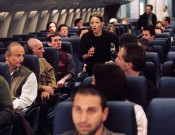
Flightplan
The mystery takes on an otherworldly tone when it turns out that none of the crew or other passengers remembers ever even seeing Julie. Worse, she isn’t listed on the manifest. Thus, what looked like a straightforward whodunit becomes complicated by the question of whether this all might be a figment of Kyle’s imagination. Did Julia also perish in the accident which claimed the life of her father? Or is some diabolical scheme afoot to make her mom look like she’s lost her mind?
Lucky for Kyle, she happens to be a jet propulsion engineer and knows the blueprint of this aircraft like the back of her hand. This enables her to roam the remote regions of the plane in quest of clues, at least as long as she can elude an annoyed air marshal (Peter Sarsgaard) intent on handcuffing and sedating his unhinged passenger.
Despite a promising premise, Flightplan crash lands following a preposterous, almost comical, turn of events.
Rating: PG-13 for violence and intense tension.
Running time: 93 minutes
Studio: Buena Vista Pictures
Congo: White King, Red Rubber, Black Death
**** 1/2
Brutality of Belgian Colonialism
Revisited in Congo
King Leopold II of Belgium conquered the Congo in 1885, and for more than 25 years he then ruled the colonized African nation with an iron fist. During his reign, he authorized the implementation of such savage measures in order to bring the indigenous people to their knees by any means necessary that over ten million Congolese had died before it was over.
Using the guise of bringing civilization and Christianity to the region, he rationalized exploiting the land and all of its citizens for profit, forcing them to work for slave wages in the burgeoning rubber industry. The slightest resistance would result in having a hand chopped off, or worse.
Congo: White King, Red Rubber, Black Death, directed by Peter Bate, revisits this disturbing chapter of African history in order to put the ruthless Leopold in proper perspective. For prior to this damning docu-drama, this beastly King had been the beneficiary of a totally contrived legacy which had misrepresented him as a benevolent despot.
Although often painful to watch, due to the gruesome nature of the graphically-depicted torture, Congo is another one of those long overdue myth-busters which serves to set a deceitful record straight. It is also the type of picture which ought to shake plenty of activists out of their complacency, since this low-budget gem shows that in this age of the video camera, the playing field has been considerably leveled, and you don’t have to have a lot of money to make a profound, cinematic impact on a mass audience.
Rating: Unrated
Running time: 84 minutes
Distributor: ArtMattan Productions
Three of Hearts: A Post Modern Family
*****
Experimental Polygamous Relationship Traced
In NYC Documentary
Sam Cagnina, the son of a Mafia hit man, fell in love with classmate Steve Margolin, when the two met in college. After graduation, the couple moved to Manhattan, setting up house in the Village where their story would not have been at all unusual had it not been for a little twist the pair put on their committed relationship.
These bi-sexual guys decided to invite a female to share their bed. The first woman they tried opted out after a couple of years, admitting she was only in love with one, but not the other. Fortunately, this was not the case with their next partner, Samantha Singh, an attractive, aspiring actress from Canada of East Indian extraction.
Samantha fell in love with both, and so the three exchanged vows, had a couple of kids, and enjoyed polygamous bliss, for about a dozen years or so. Their unorthodox union is the subject of Three of Hearts: A Post Modern Family, a movie shot over on videotape by Susie Kaplan, a nosy neighbor with a knack for unobtrusively invading their privacy to capture intimate, intense, and painful exchanges among her subjects who behave as though they were unaware of the presence of a camera.
Although it’s not hard to predict the mess where this ill-advised arrangement is headed, given that the guys seem more gay than straight, that doesn’t make the ensuing emotional train wreck any less compelling to watch. Of course, you have to feel bad for kids brought into the world who didn’t ask to be born with two fathers, both of whom eventually abandon their mom. Otherwise, one comes away with a sense that the participants consider themselves better off for having thumbed their noses at society by declaring themselves a tri-ogamous with not only Adam and Eve, but Steve, too.
An endlessly fascinating case study.
Rating: Unrated
Running time: 95 minutes
Distributor: ThinkFilm
Protocols of Zion
*****
Anti-Semitism Explored in
Tolerance Teaching Documentary
Over the ages, Jews have been unfairly associated with a variety of unflattering stereotypes, many of which have proven to display an amazing resilience, resurfacing again and again, despite an abundance of proof to the contrary. In recent years, anti-Semites have relied on two long-debunked books in particular, The International Jew: The World’s Foremost Problem (1920), by auto magnate Henry Ford, and The Protocols of the Meetings of the Learned Elders of Zion (1897), translated by Victor Marsden. Both of these treatises have encouraged prejudice by speaking of a conspiracy among a secret cabal of powerful Jews dedicated to world domination.
And Marc Levin, disturbed by the resurgence of anti-Semitism in recent days, decided to do something about it. Armed with nothing more than a video camera and a microphone, he traveled around the country, confronting those who hate his people to clarify the basis for their feelings.
In the course of his journey, he found Sikhs, Skinheads, Blacks, Palestinian-Americans, inmates, Christian conservatives, Mel Gibson’s father, and others eager to weigh-in on why they have a bone to pick with the Jews. One person refers to America as Jewmerica, while another insists that Pepsi stands for Pay Every Pepsi Support Israel, and yet another asserts that Jews were warned about 9/11. This bigot claims that the Holocaust never happened, that one blames the Jews for the death of Christ.
Overall, Protocols of Zion paints an ugly picture by allowing the proponents of this litany of complaints to hang themselves by their own obviously uninformed ideas. What makes the film valuable is that Mr. Levin is not afraid to mix it up, getting right in the face of his adversaries, challenging them at every turn. What makes it even more thought-provoking is that he even ventures to Hollywood to ask Jews some tough questions like, "Can you criticize Israel and be a good Jew?" and "Do Jews control show business?"
One of most interesting interviewees is Douglas Rushkoff, author of Nothing Sacred: The Truth about Judaism. He admits, "In a sense, our detractors have us right in that we are a corrosive force. We are breaking down the false gods of all nations and all people." One of the most discouraging scenes features a three year-old Egyptian girl who has been indoctrinated to refer to Jews as apes and pigs.
The most hope comes from the Nazi hunter Elie Wiesel who says it all with this heartfelt soliloquy: "The anti-Semite doesn’t know me, but he hates me. He hated me before I was born. Help us fight it. Help us disarm it. For hatred is dangerous. Hatred is contagious. He who hates Jews will end up hating everybody, and then himself."
A picture which makes a great case against intolerance simply by shedding a bright light on ignorance.
Rating: Unrated
Running time: 92 minutes
Studio: ThinkFilm
In Her Shoes
****
Seismic Sibling Rivalry at Center of
Dysfunctional Family Drama
Maggie May (Cameron Diaz) and Rose (Toni Collette) Feller may have been best friends all their lives, but the sisters are also polar opposites, as different from each other as night and day. Head-turner Maggie is an amoral, academic underachiever who always relied on her womanly wiles and sticky fingers to get whatever she wants. Her older sister Rose, on the other hand, is a relatively mature Plain Jane who excelled in school but never had much luck when it came to guys.
As a result, Rose is enjoying a flourishing career at a Philadelphia law firm while her ne’er-do-well sibling is still living at home and chronically unemployed. Yet, what binds the two together is a scarring childhood trauma that ripped the rest of their relatives apart.
Their mom perished in a suspicious car accident when Maggie was only six, and their maternal grandmother, Ella (Shirley MacLaine) reacted by blaming her son-in-law, Michael (Ken Howard), for her daughter’s untimely death. Their dad responded by ending all contact with that side of the family, and by misleading his little girls into believing that Ella had also passed away.
To make matters worse, today, Michael is remarried to Sydelle (Candace Azzara), a selfish shrew who clearly favors her own daughter, Marcia (Jackie Geary), over her step-daughters. And when Maggie shows up drunk in the middle of the night after an impromptu liaison with a cute classmate (Anson Mount ) at her 10th high school reunion, Marcia seizes on the lush’s inebriated state as an excuse to throw her out of the house.
Against her better judgment, Rose comes to the rescue, allowing her little sister to crash at her place, never suspecting that the shameless flirt would even think about seducing Jim (Richard Burgi), the handsome hunk she has just started a relationship with. But after catching them in a compromising position, she decides that such a transgression is unforgivable, and kicks Maggie out on the spot.
This over-plotted point of departure sets up the convoluted premise of In Her Shoes, as messy a dysfunctional family drama as any soap opera fan could hope to find. Directed by Oscar-winner Curtis Hanson (L.A. Confidential), the movie is based on the best-selling novel of the same name by Jennifer Weiner.
As adapted to celluloid, the sisters’ seismic sibling rivalry sits at the center of the story, though the attention-deficit production is littered with far too many secondary themes and supporting characters to keep track of, a common problem encountered in bringing books to the big screen. When Maggie relocates to Florida, she moves in with her long-lost grandma, finally finding her purpose in life working with the very colorful residents of this overpopulated retirement community.
Simultaneously, back in Philly, morose Rose finds herself being chased by Simon (Mark Feuerstein), a patient suitor who isn’t bothered by the fact that his former colleague has quit her prestigious position at the firm to become a professional dog walker. While waiting for Simon to pop the question, the innumerable loose ends are addressed to ensure that their storybook wedding will be attended by an estranged sister, an absentee grandmother, an evil step-mom, a weak-willed father, plus plenty of the entertaining second bananas we’ve gotten to know along the way.
Cluttered and predictable, but laced with laughs and enough of an emotional payoff to make it all worthwhile.
Rating: PG-13 for sex, expletives, and mature themes.
Running time: 130 minutes
Distributor: 20th Century Fox
|